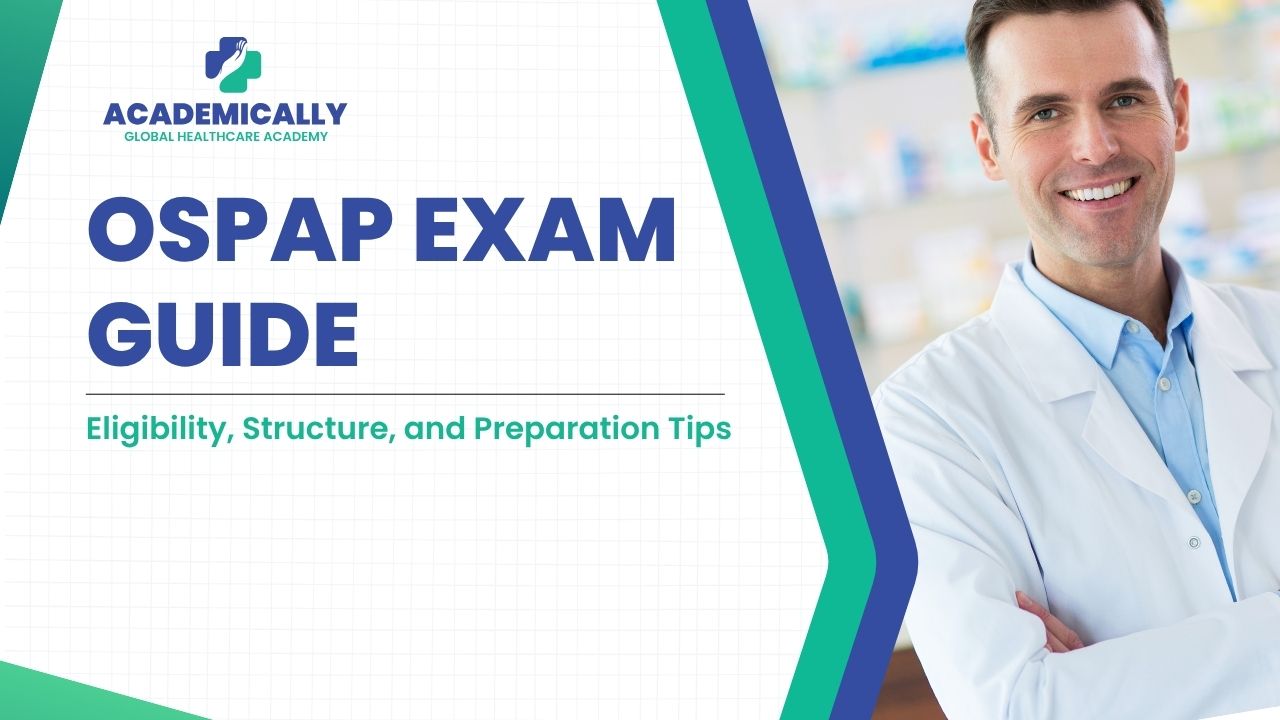What Is the Overseas Pharmacists Assessment Programme (OSPAP)?
The OSPAP is a postgraduate diploma for pharmacists. This is for pharmacists who have qualified outside the European Economic Area (EEA) and want to practice in the UK. This is to make sure that your pharmacy knowledge meets the UK standards of the healthcare system.
This course updates you on UK pharmacy law and ethics. Strengthens your clinical skills and patient communication, all essential for working confidently in the NHS environment.
Why Is OSPAP Important for International Pharmacists?
Pharmacy practice varies widely across countries. The OSPAP checks whether the international pharmacists meet the UK’s high standards and prepares you to deliver safe, effective care to patients here.
Plus, completing OSPAP is mandatory if you want to sit for the General Pharmaceutical Council (GPhC) registration assessment, which is the final hurdle before you can work as a registered pharmacist in the UK.
OSPAP Exam Eligibility Criteria in 2025
You can apply for OSPAP in the UK if you meet the following exam requirements:
| Requirement | Details |
| Pharmacy Degree | Equivalent to UK BPharm/PharmD |
| Registration Status | Registered or eligible to register as a pharmacist in your home country |
| English Proficiency | IELTS score of 7.0+ in each section or equivalent in TOEFL, PTE, or OET |
| Work Experience | Not mandatory, but some universities may prefer 6+ months of patient-facing experience |
| Medical Fitness | You must be fit to undertake placements and clinical practice |
How to Apply for the OSPAP in the UK
1. Apply for a GPhC Eligibility Assessment
You have to start by submitting your documents to the General Pharmaceutical Council (GPhC) for evaluation. This includes:
- Your pharmacy degree and transcripts
- Proof of registration in your home country
- English language test results
- Passport and identity documents
There’s a non-refundable fee of £739 for this assessment. Once approved, you’ll receive a letter confirming your eligibility to apply for an OSPAP course.
2. Clear English Language Test
To work in the UK, you have to clear IELTS, OET, TOEFL, or PTE. This is to prove your English proficiency. You have to meet the minimum score requirements set by the GPhC and the university you’re applying to.
3. Apply to Universities Offering OSPAP
The next step would be to choose the university for OSPAP. Many universities conduct interviews (often between November and February), so prepare to talk about your background, experience, and motivation.
4. Get Admission and Begin Your Course
Once accepted, you’ll join the OSPAP course starting typically in September or October, depending on the university.
Best Universities for OSPAP in the UK (2025)
| University Name | Location | Tuition Fee | Intake | Course Duration |
| Aston University | Birmingham | £14,950 | September of each year | 9 months |
| Kingston University | London, England | £18,100 | September of each year | 1 year |
| University of Hertfordshire | Hatfield | £14,250 | October | 1 academic year |
| University of Brighton | Brighton | £16,900 | September of each year | 1 year |
| University of Sunderland | Sunderland | £16,500 | September | 1 year |
What’s the OSPAP Exam and Course Structure Like?
You’ll learn through lectures, seminars, and hands-on sessions that cover:
- UK pharmacy law and ethics
- Clinical pharmacy practice
- Public health
- Patient communication skills
- Practical placements in various pharmacy settings
What Comes After the OSPAP?
Once you complete the OSPAP course, here’s what’s next:
52 Weeks of Foundation Training
This is like an internship where you work under supervision in a community or hospital pharmacy setting. It’s essential for practical learning and is required for your final registration.
GPhC Registration Assessment (GPhC Exam)
This exam tests your clinical knowledge and decision-making skills. Passing it is mandatory to register as a UK pharmacist.
Pharmacist Registration in the UK
After passing the exam, you can apply to the GPhC Register. Then, you can begin your career as a licensed pharmacist in the UK.
OSPAP vs GPhC Exam: What’s the Difference?
- OSPAP is the academic course that prepares you for UK pharmacy practice.
- GPhC Exam is the final licensure test you take after OSPAP and foundation training.
You must complete the OSPAP before you’re eligible to sit for the GPhC registration exam (unless you’re from certain EEA countries).
Also Read: OSPAP vs. OPRA Exam
OSPAP Exam Preparation Tips
- OSPAP is all about clinical scenarios, UK-specific pharmacy law, ethics, and public health.
- Attend lectures regularly. Be consistent.
- Take practice exams offered by coaching classes like Academically that mocks GPhC-style questions.
- Patient interaction is a big part of UK pharmacy practice. So, make sure to work on your communication skills.
- Make a study plan that includes revision, mock tests, and rest time.
Need Help with the OSPAP Process?
If you’re an Indian or international pharmacist planning to take the OSPAP route, we can help you every step of the way.
From shortlisting GPhC-approved OSPAP course providers to helping you submit a strong application, our team makes the entire process easier and more focused.
You’ll also get access to:
- Live and recorded classes, mock tests, and study modules designed around the OSPAP syllabus
- Help with SOPs and LORs, UK universities are strict about competitive applications, and this can make a real difference
- Visa support, including guidance on Tier 4 student visa requirements
- Updates on 2025 intake timelines, interview prep, and university-specific requirements
- Information on whether you can apply without IELTS, and which tests are accepted instead
- Clarity on OSPAP course fees, duration, and online application process
Final Thoughts
Becoming a pharmacist in the UK, opens a world of opportunities. This is the right time for international pharmacists to fill the pharmacist shortage in the UK.
We’ve helped hundreds of international pharmacists prepare for OSPAP, shortlist the right universities, and submit strong applications. If you need help with your SOPs, visa process, mock tests, or even choosing the right course provider, we’ve got you covered.
If you want to make this dream a reality, talk to us and make your way to the UK.





